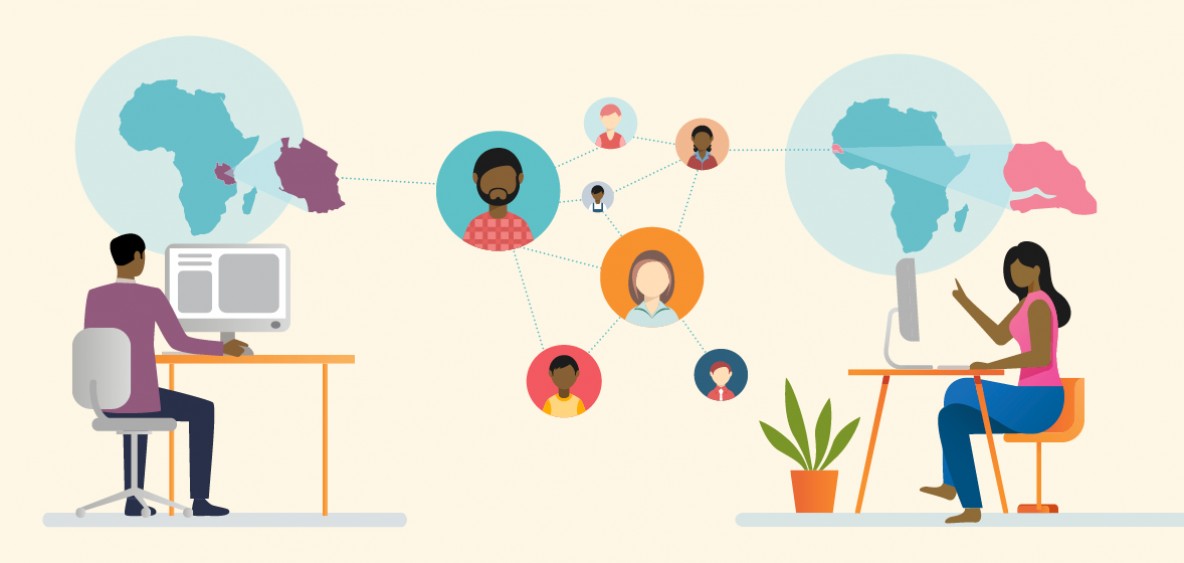
As the RFS country projects face new challenges due to the COVID-19 pandemic, virtual Learning and Exchange Webinars provide a platform for RFS team members to provide updates, share successful approaches, discuss challenges, and exchange valuable insights.
Each year the RFS Annual Workshop provides an opportunity for RFS country project and Regional Hub team members to get together, share progress and learn from each other’s experiences. Although this year’s RFS Annual Workshop was cancelled in response to the COVID-19 pandemic, the Programme Coordination Unit (PCU) wanted to ensure that country project teams and Regional Hub partners were still able to connect and share experiences virtually.
In July, the PCU held two Country Project Learning and Exchange webinars with presentations from the Tanzania, Senegal, Nigeria, and Malawi country projects to update on their progress and engage in facilitated discussions with the 12 RFS country projects and partners who joined the webinars.
The Project Coordinators from each country project shared successful project interventions, approaches to gender mainstreaming, challenges to implementation and learning, and key activities and objectives for 2020, including amended plans due to COVID-19.
If you missed the webinars, we have summarised some of the key insights from the presentations below. You can also watch the recordings of the webinars and download the country project presentations from the respective event pages: Webinar 1 (Senegal and Tanzania); Webinar 2 (Malawi and Nigeria).
During his presentation, RFS Tanzania Project Coordinator, Joseph Kihaule, spoke about the importance of supporting communities in taking ownership of planning and utilisation of their natural resources. The RFS Tanzania project is doing this through the establishment and capacitation of Village Natural Resource Management Committees and Village Land Use Planning Committees in targeted communities. “Land is crucial to everyone,” explained Joseph, “so the techniques we use in land use planning involve many stakeholders—the people own this process.”
Joseph underscored the project’s efforts to secure broad-based participation in land use planning actives, especially when it comes to women and youth. To date, the project has ensured that women and youth not only participate but take active leadership roles within the multi-stakeholder platforms: 6 out of 17 Village Natural Resource Management Committees have female secretariats, while 9 Village Land Use Planning Committees have youth chairpersons.
This year, the RFS Senegal project has been implementing activities in various work areas, including restoring 1000 ha of mangrove forests, establishing 12 vegetable farms, installing 10 solar-powered food processing units, and developing of three dams to improve the availability of pastoral water.
Within each of these work areas, capacity development has been a central focus. In 2020, the project has held 22 workshops, raising the awareness of over 1,600 participants in sustainable land management and climate change resilience. Project Coordinator, Ndèye Khady Fal, believes that the project’s training and awareness raising efforts are key to the project’s sustainability, sharing with the other country projects, “We are training trainers to disseminate techniques because we believe this should be a long-term project.”
In 2020, the RFS Nigeria project continues to raise awareness of the benefits of climate-smart agriculture (CSA) practices through various forms of engagement. CSA training courses have continued throughout the year in 70 communities, reaching over 7,000 farmers. Extension workers have been trained in FAO’s Farmer Field School approach and have been equipped with motorcycles in order to extend the reach of the project and expand the adoption of CSA practices.
In spite of the floods and drought experienced during the rainy season, the CSA demonstration plots showed a 40-50% increase in yield. CSA training in soil erosion control, earth bunding, and planting of cover crops has proven extremely beneficial to farmers. “A farmer told us that this time last year his land was flooded, but now thanks to the training, the farm is not flooded like previous years,” Project Coordinator, Abdullahi Garba Abubakar, shared with the other country project teams.
The project has already demonstrated potential to scale. The success of the demonstration plots has attracted interest from other farmers who were not originally involved in the RFS programme. Moreover, state governors from Kano and Gombe State are planning to replicate the agricultural centre model that has been developed under the project. This success can in part be attributed to the participation and buy-in of a wide range of actors, explained Abdullahi. “The overall experience so far has been rewarding because of overwhelming support from beneficiaries, community leaders and government.”
Over the past year, the RFS Malawi project has been working to establish and train local multi-stakeholder platforms for managing natural resources within project communities. The project has supported the establishment of Catchment Management Committees (CMCs) in all five catchment areas and 66 Village Nature Resource Management Committees (VNRMCs), both of which will be responsible for implementing catchment-level conservation activities. Country project team member, Bryson Msiska, emphasised that involving community level stakeholders is essential for planning and implementing catchment management interventions: “In terms of sustainability of the project, the village natural resource committees have been empowered to manage their own investments and implement actual interventions on the ground.”
Through these multi-stakeholder platforms, catchment-level Sustainable Land Management (SLM) practices are being scaled up: 132 lead farmers have been trained in SLM practices through Farmer Field Schools, while a further 500 farmers have adopted improved soil and water management practices. The project has supported local councils in developing 32 village forest management plans. These plans have overseen the establishment of 32 tree nurseries, reforestation of 67 ha of land, and natural regeneration of 41 ha of vegetation cover.
Subscribe to our monthly newsletter to receive updates on stories directly from the field across all our projects, upcoming events, new resources, and more.